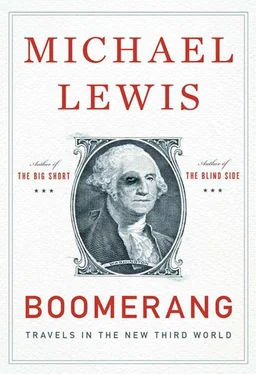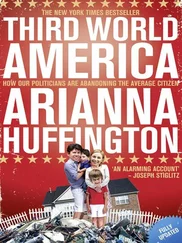As the scope of the Irish losses has grown clearer, private investors have been less and less willing to leave even overnight deposits in Irish banks, and completely uninterested in buying longer-term bank bonds. The European Central Bank has quietly filled the void: one of the most closely watched numbers in Europe has been the amount the ECB has loaned to the big Irish banks. In late 2007, with the markets still suspending their disbelief, the banks had borrowed 6.5 billion euros. By December of 2008 the number had jumped to 45 billion. As Burton spoke to me the number was rising, from around 86 billion to a fresh high of 97 billion. That is, from November 2007 to October 2010 the Irish banks have borrowed 97 billion euros from the European Central Bank to repay private creditors. In September 2010 the last big chunk of money the Irish banks owed to their bondholders, 26 billion euros, came due. Once the bondholders were paid off in full, a window of opportunity for the Irish government closed. A default of the banks would now not be a default to private investors but a bill presented directly to European governments. This, by the way, is why there are so many important-looking foreigners in Dublin dining alone at night. They’re here to make sure someone gets his money back.
One measure of how completely the Irish can’t imagine offending their foreign financial rulers is how quickly Burton declines to contemplate such a default. She bears no responsibility at all for the banks’ private debts, and yet when we creep up on the possibility of simply walking away from them, she veers away. Actually, she ups and leaves. “Oh, I have to go,” she says. “I have to meet the finance minister with the bad news.” Lenihan has called a private meeting with the opposition so that its leaders will be the first to hear of the draconian new Irish budget. This meeting is held not inside the Parliament, where the media can be kept at arm’s length, but in a nearby building where the media are allowed to congregate. “We tried to have it in here but he moved it outside,” says Burton. “He’s taken to bringing us in to tell us the bad news first, so that when we walk out we’re the ones announcing it to the media.” She smiles. “He’s tricky that way.”
BRIAN LENIHAN IS the last remaining Irish politician anywhere near power whose mere appearance does not cause people on the streets of Dublin to explode with either scorn or laughter. He came to the job just weeks before the crisis, and so escapes blame for its origins. He’s a barrister, not a financial or real estate person, with a proven ability to earn a good living without being bribed by property developers. He comes from a family of political people who are thought to have served honorably, or at any rate not used politics to enrich themselves. And, in December 2009, he was diagnosed with pancreatic cancer. Anyone who has been anywhere near an Irish Catholic family knows that the member who has had the most recent run of bad luck enjoys exalted status—the right to do pretty much whatever he wants to do while everyone else squirms in silence. Since news of Lenihan’s illness broke—just days after he’d learned of it himself, apparently, and before he’d told his children—he’s minimized his suffering. Running under the public opinion polls that show the Irish feel a lot better about the minister of finance than they do about other politicians in his party is a common, unspoken understanding of his bravery. †
Brian Lenihan is also, as Joan Burton pointed out, tricky. It’s racing up on eight in the evening when I meet him in a Department of Finance conference room. He’s spent most of his day defending the harshest spending cuts and tax hikes in Irish history to Irish politicians, without offering any details about who, exactly, will pay for the bank’s losses. (He’s waiting until after the single by-election that the Dáil authorized is held.) He smiles. “Why is everyone so interested in Ireland?” he asks, almost innocently. “There’s really far too much interest in us right now.”
“Because you’re interesting?” I say.
“Oh no,” he’s says, seriously. “We’re not, really.”
He proceeds to make the collapse of the Irish economy as uninteresting as possible. This awkward social responsibility—normalizing a freak show—is now a meaningful part of the job of being Ireland’s finance minister. At just the moment the crazy uncle leapt from the cellar, the drunken aunt lurched through the front door—and, in front of the entire family and many important guests, they carved each other to bits with hunting knives. Daddy must now reassure eyewitnesses that they didn’t see what they think they saw.
But the evidence that something deeply weird just happened in Ireland is still too conspicuous. A mile from the conference table where we take our seats you can still find a moonscape of vast two-year-old craters from which office parks were once meant to rise. Fully finished skyscrapers sit empty, water pooling on their lobby floors. There’s a skeleton of a tower, cranes at rest on either side, like parentheses. It was meant to house Anglo Irish Bank. There’s an empty new conference center that cost 75 million euros to build that has never been hooked up to the Dublin sewer and water systems. There’s a city dump for which a developer paid 412 million euros in 2006—and which is now, when you include the cleanup costs, valued at negative 30 million euros. “Ireland is very unusual,” says William Newsom, who has forty years of experience valuing commercial real estate for Savills in London. “There are whole swaths of either undeveloped land with planning permission or even partially developed sites which for practical purposes have zero value.” The peak of the Irish madness is frozen in time for all to see. There’s even an empty Starbucks, in the heart of what was meant to be a global financial center to rival London, where a carton of low-fat milk curdles beside a silver barista pitcher. The finance minister might as well be standing in front of Pompeii and saying that the volcano wasn’t really worth mentioning. Just a little lava!
“THIS ISN’T ICELAND,” is what he actually says. “We’re not a hedge fund that’s populated by 300,000 farmers and fishermen. Ireland is not going back to the eighties or the nineties. This is all in a much narrower band.” And then he goes off on a soliloquy, the main point of which is: Ireland’s problems are solvable and I am in control of the situation.
Back in September 2008, however, there was evidence that he wasn’t. On September 17 the financial markets were in turmoil. Lehman Brothers had failed two days earlier, and the shares of Irish banks were plummeting and big corporations were withdrawing their deposits from them. Late that night Lenihan phoned David McWilliams, a former research analyst with UBS in Zurich and London, who had moved back home to Dublin and turned himself into a writer and media personality. McWilliams had been loudly skeptical about the Irish real estate boom. Two weeks earlier he’d appeared on a television show with Lenihan: Lenihan had seemed to him entirely untroubled by the turmoil in the financial markets. Now he wanted to drive out and ask McWilliams’s advice on what to do about the Irish banks.
The peculiar scene appears in McWilliams’s charmingly indiscreet book Follow the Money . Lenihan arrives at the McWilliams residence, a forty-five minute drive outside of Dublin, marches through to the family kitchen, and pulls a hunk of raw garlic out of his jacket pocket. “He kicked off by saying if his officials knew he was here in my house, there’d be war,” writes McWilliams. The finance minister stayed until two in the morning, peeling cloves of raw garlic and eating them, and anxiously picking McWilliams’s brain. McWilliams came away with the feeling that the minister didn’t entirely trust the advice he was getting from the people around him—and that he was not merely worried but confused. McWilliams told me that he sensed the mental state of the Finance Ministry was “complete chaos.”
Читать дальше












